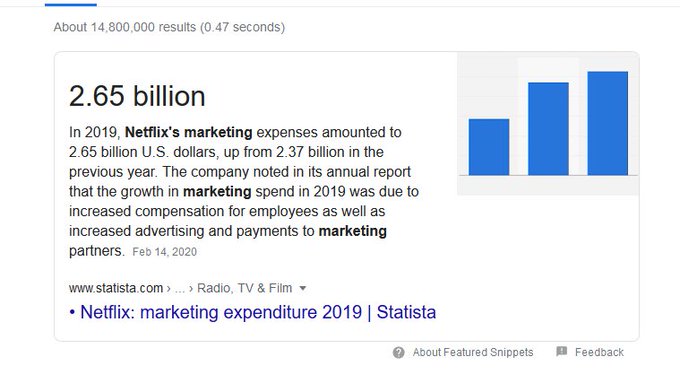Comments, observations and thoughts from two bloggers on applied statistics, higher education and epidemiology. Joseph is an associate professor. Mark is a professional statistician and former math teacher.
Monday, August 3, 2020
There's something almost quaint about discussing Netflix's business model in 2020
Netflix’s price earnings ratio may be high (>80), but at least it has a price to earnings ratio.
It can accused of being at opaque company known for deceptive messaging and suspect statistics, but we’re reasonably certain it has never committed fraud.
We can have mixed feelings about Reed Hastings but he has never suggested that the SEC should suck on any part of his body.
And finally, it’s not Quibi.
But while the business tactics of a Netflix may not be as over the top as those of Tesla, they are, in many ways, more instructive. We are still living in a hype economy and no company has been more dedicated, disciplined or adept at working that system than Netflix. While companies like Disney may spend more total, relative to revenue (we won’t even get into profits), Netflix leads the pack.
Take this New Yorker article by Alex Barasch
The Stunning Second Life of “Avatar: The Last Airbender”
In and of itself, competent and reasonably well researched (with very notable misleading point), but in the larger context, it demonstrates how effectively companies manipulate even the most respectable publications.
Here’s the familiar process:
1. NF had a popular and (more importantly) talked-about hit with its reboot of She-Ra. Though the show is a “Netflix Original,” the company doesn’t have any real stake in the franchise.
2. NF follows up with a live-action reboot of another old cult-favorite cartoon, Avatar (no connection to the Cameron movie). Once again, this is apparently a licensing deal with little to no substantial IP acquired by NF.
3. NF pours tens of millions of dollars into promoting the original show in addition to laying a heavy thumb on the recommendation engine and possibly tweaking their self-reported viewership numbers.
4. A range of influence is applied to journalists (none of which is by any stretch new or limited to Netflix), from the actually having the PR agents write the stories or trading puff pieces for exclusives to simply providing a veneer of newsworthiness (it's a big hit, everybody's talking about it) for an easy, click friendly story such as the Barasch piece.
5. But what’s remarkable is the extent that Netflix can count on even the legitimate journalists writing stories in the last category to follow the company’s narrative without question or deviation. Interesting example, Netflix features prominently in this article and readers could easily come away with the impression that this was exclusive to the platform, possibly even a property owned by the company. It's not. It is a Viacom/CBS show also available on CBS All Access.
All of this raises the question of why Netflix has spent hundreds of millions, possibly billions promoting shows like Avatar, She-Ra, House of Cards, Orange is the New Black, Jessica Jones, and others which it does not own. That’s actually my favorite part of the discussion, but unfortunately it is also a topic for another day.
Subscribe to:
Post Comments (Atom)

No comments:
Post a Comment